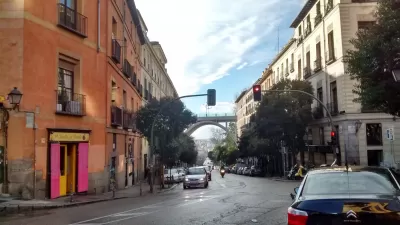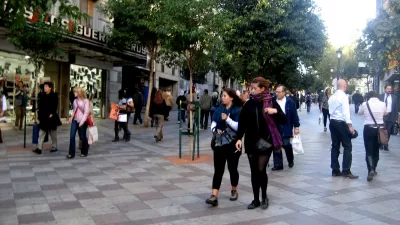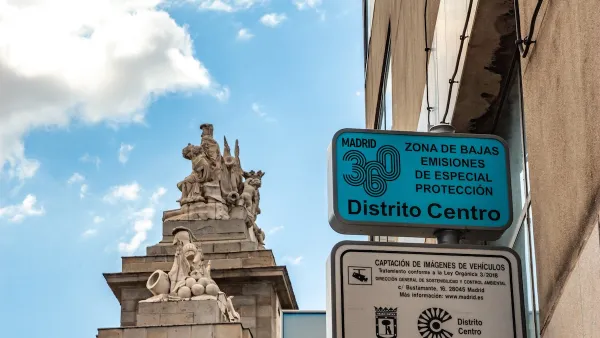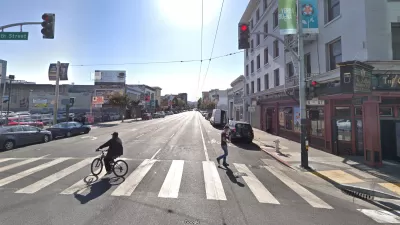A new conservative administration says it wants to do away with the ban on cars in the city center.

Feargus O’Sullivan reports that Madrid’s ban on cars in the city center may be rolled back as the result of political shifts after recent elections. "A new three-party coalition will now govern the city, involving a right-wing, a centrist and an extreme-right party. All have previously declared themselves in some form against the car ban introduced by Madrid’s outgoing left-wing mayor, Manuela Carmena."
The new political leadership is taking aim at the policy even as pollution levels have dropped substantially in Madrid since the car ban was instituted last year and as property values have increased in areas where the ban is in effect. "The extreme-right party, Vox, supports another option: Keep the cars off the Gran Via and channel that traffic into a cross-downtown tunnel. This would appease the pro-car lobby without alienating locals who have grown fond of the pedestrianized main street," writes O’Sullivan.
That plan is unlikely, however, because of the logistical difficulties and costs involved in tunneling in Madrid. And even relaxing the ban by allowing cars back on certain streets could prove to be politically challenging, notes O’Sullivan. "And it could prove expensive in other ways: Madrid has in the past incurred millions of euros of fines from the E.U. for exposing its citizens to unacceptably high levels of pollution—levels that have since dropped, thanks to the car ban. A traffic spike that pushed pollution back above safe levels would be both costly and embarrassing."
FULL STORY: Is This the End of the Road for Madrid’s Car Ban?

Planetizen Federal Action Tracker
A weekly monitor of how Trump’s orders and actions are impacting planners and planning in America.

San Francisco's School District Spent $105M To Build Affordable Housing for Teachers — And That's Just the Beginning
SFUSD joins a growing list of school districts using their land holdings to address housing affordability challenges faced by their own employees.

The Tiny, Adorable $7,000 Car Turning Japan Onto EVs
The single seat Mibot charges from a regular plug as quickly as an iPad, and is about half the price of an average EV.

Seattle's Plan for Adopting Driverless Cars
Equity, safety, accessibility and affordability are front of mind as the city prepares for robotaxis and other autonomous vehicles.

As Trump Phases Out FEMA, Is It Time to Flee the Floodplains?
With less federal funding available for disaster relief efforts, the need to relocate at-risk communities is more urgent than ever.

With Protected Lanes, 460% More People Commute by Bike
For those needing more ammo, more data proving what we already knew is here.
Urban Design for Planners 1: Software Tools
This six-course series explores essential urban design concepts using open source software and equips planners with the tools they need to participate fully in the urban design process.
Planning for Universal Design
Learn the tools for implementing Universal Design in planning regulations.
Smith Gee Studio
City of Charlotte
City of Camden Redevelopment Agency
City of Astoria
Transportation Research & Education Center (TREC) at Portland State University
US High Speed Rail Association
City of Camden Redevelopment Agency
Municipality of Princeton (NJ)





























